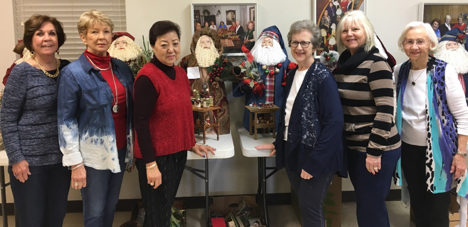
By: Dr. Andrew Yox, NTCC Honors Director
Note: The honors students and program at Northeast Texas Community College, local students in need, and Franklin county students have benefitted enormously from the philanthropic handiwork of “Santa’s Sweeties.” This is their story.
Handcrafted dolls may be the oldest of toys, and some of them, the most valuable. Bisque dolls made in nineteenth-century Germany and France today cost upwards of $20,000 dollars apiece. One porcelain model recently sold for $300,000. Japanese Bunraku dolls, fit for a puppet theatre, start at $8,000. Contemporary, upscale Hopi Kachina dolls are worth as much.
Doll collectibles are handicrafts that also evoke local culture. A Ndebele doll appearing on a woman’s seat in South Africa means a young man wants to marry her. Lupita dolls in Mexico are craft relatives of the Virgin Mary, and Day of the Dead figures. The famous Martryoshka, doll-within-doll creations of Russia evoke motherhood, and continuity over the generations.
And what about Northeast Texas? Do we have a keepsake, a collectible doll that says something of our area?
One idea stemmed from a Clarksville church bazaar around the year, 1965. This may, in turn, have stemmed from something older. In any case, Mary Lou Mowery, of Franklin County remembers seeing a beautifully formed, handcrafted Santa Claus.
It was a sight she did not forget.
Northeast Texas currently has its own regional keepsake, handcrafted doll collectibles of a decent price which reinforce the idea of Christmas giving with philanthropy. They are upgraded versions of that Clarksville memory, and they not only radiate the altruism of St. Nicholas, upon which the Santa Claus legend is based, their proceeds have funded $20,000 in gifts to local young people, and charities.
Each Santa is an original made from scratch by the sewing circle of the Mount Vernon Methodist church—known locally as “Santa’s Sweeties.” They consist of high-quality upcycled materials, terracotta faces, quality yarns, beads, and special fabrics secured in Dallas. This group has worked four years perfecting dolls whose actual cost dwarfs the price of their handiwork.
Jerald Mowery of Mount Vernon, a former furniture salesman, constructs both the base upon which the doll is assembled, and various wooden accessories for the dolls, such as sleighs, rocking horses, and tables. These are also beveled and shaped individually--made of cherry, cedar, or maple—varnished, and shellacked.
For Christians in Northeast Texas, Christmas is the story of a miraculous, undeserved gift—that keeps on giving, the Redeemer, Christ Jesus. For retailers, of whatever faith, Christmas is often the season when the red ink can turn black with profits—thus Black Friday, a day of frenetic Christmas shopping. For the Methodist tradition, the Christmas-gift-theme finds an echo in one of the most notable quotes concerning the habit of giving by a major religious figure. As John Wesley noted, “Gain all you can, save all you can, and give all you can.”
The ladies pictured above, left to right are: Mary Lou Mowery—pattern maker, Pat Wright--body maker, Su Gates--miscellaneous handiwork, Joy Stone--seamstress, Tommie Smith-- patternmaker, and Ruby Neely--decorator. Other ladies associated with the construction have been: Lauren Herman—face specialist, Linda Philhower—pattern maker, Carol Ann Scott—costume designer, Diane Shelton—generalist, and Gail Reed--consultant.
